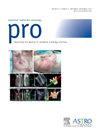Understanding Patient Priorities for Religious and Spiritual Needs During Radiation Therapy for Gynecological Malignancies
IF 3.5
3区 医学
Q2 ONCOLOGY
引用次数: 0
Abstract
Purpose
Addressing religion and spirituality (R/S) in the patient care setting has shown associations with health care outcomes and quality of life. Patients with gynecologic malignancies demonstrate increased distress and fear following treatment. The Faith or belief, Importance and Influence of spirituality, spiritual Community; and interventions to Address spiritual needs (FICA) Spiritual History Tool outlines 4 domains of assessment. Using the FICA Spiritual History Tool, we sought to evaluate the importance of R/S for patients with gynecologic cancer who had undergone external beam radiation therapy or brachytherapy and assess the most meaningful questions from the FICA Spiritual History Tool that best facilitate conversation.
Methods and Materials
Eleven patients with gynecologic malignancy treated with external beam radiation therapy and/or brachytherapy were interviewed with the FICA Spiritual History Tool to assess each question as helpful or unhelpful, and to select 1 or 2 questions they perceived to best open the conversation with providers.
Results
Average age was 59 years old (range, 37-74). Religious identities included Christian denominations, Buddhist, Jewish, Muslim, and Hindu. Nine of 11 patients (82%) rated the importance of their faith as 5/5. On average, 9.5 of 11 questions (range, 7-11) were thought to be helpful if asked. All patients reported the same 6 questions as helpful, ranging across all domains. The two most common questions identified to best facilitate conversation were related to alleviating stress: “Do you have spiritual beliefs that help you cope with stress?” and “Have your beliefs influenced you in how you handle stress?”
Conclusions
Among gynecological cancer patients who underwent radiation therapy, conversations regarding R/S are highly coveted across a spectrum of demographics and ethnic identities. How R/S helps patients cope with stress was identified as the most meaningful question to open this conversation with providers. Furthermore, engaging patients on their R/S invites further conversation and understanding regarding stress, coping, and anxiety surrounding treatment, findings that should be explored in larger cohorts.
了解妇科恶性肿瘤放射治疗中患者对宗教和精神需求的优先级
目的:在病人护理环境中处理宗教和灵性(R/S)已显示出与卫生保健结果和生活质量的关联。妇科恶性肿瘤患者在治疗后表现出越来越多的痛苦和恐惧。信仰或信仰,灵性的重要性和影响,精神社区;和解决精神需求的干预(FICA)精神历史工具概述了四个评估领域。使用FICA精神历史工具,我们试图评估R/S对接受过外束放射治疗或近距离治疗的妇科癌症患者的重要性,并评估FICA精神历史工具中最有意义的问题,这些问题最有利于对话。方法和材料使用FICA精神病史工具对接受外束放射治疗和/或近距离治疗的妇科恶性肿瘤患者进行访谈,评估每个问题的帮助或无益,并选择他们认为最好的1或2个问题与提供者进行对话。结果患者平均年龄59岁(37 ~ 74岁)。宗教身份包括基督教、佛教、犹太教、穆斯林和印度教。11名患者中有9名(82%)认为信仰的重要性为5/5。平均而言,在11个问题(范围7-11)中,有9.5个问题被认为是有帮助的。所有患者都报告了同样的6个问题,这些问题涵盖了所有领域。最容易促进谈话的两个问题与减轻压力有关:“你有帮助你应对压力的精神信仰吗?”和“你的信仰对你处理压力的方式有影响吗?”结论:在接受放射治疗的妇科癌症患者中,关于R/S的对话在人口统计学和种族认同方面都是非常令人垂涎的。R/S如何帮助患者应对压力被认为是与提供者展开对话的最有意义的问题。此外,让患者参与到他们的R/S中,可以进一步讨论和理解围绕治疗的压力、应对和焦虑,这些发现应该在更大的队列中进行探索。
本文章由计算机程序翻译,如有差异,请以英文原文为准。
求助全文
约1分钟内获得全文
求助全文
来源期刊

Practical Radiation Oncology
Medicine-Radiology, Nuclear Medicine and Imaging
CiteScore
5.20
自引率
6.10%
发文量
177
审稿时长
34 days
期刊介绍:
The overarching mission of Practical Radiation Oncology is to improve the quality of radiation oncology practice. PRO''s purpose is to document the state of current practice, providing background for those in training and continuing education for practitioners, through discussion and illustration of new techniques, evaluation of current practices, and publication of case reports. PRO strives to provide its readers content that emphasizes knowledge "with a purpose." The content of PRO includes:
Original articles focusing on patient safety, quality measurement, or quality improvement initiatives
Original articles focusing on imaging, contouring, target delineation, simulation, treatment planning, immobilization, organ motion, and other practical issues
ASTRO guidelines, position papers, and consensus statements
Essays that highlight enriching personal experiences in caring for cancer patients and their families.
 求助内容:
求助内容: 应助结果提醒方式:
应助结果提醒方式:


